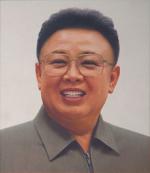Disable ads!
Kim Jong Il
This article contains Korean text. Without proper rendering support, you may see question marks, boxes, or other symbols instead of Hangul and hanja. Kim Jong-il Chosŏn'gŭl 김정일 Hancha 金正日 Revised Romanization Gim Jeong(-)il McCune–Reischauer Kim Chŏngil Kim Jong-il (Korean pronunciation: [ɡ imd zɔŋil]; 16 February 1941 – 17 December 2011) was the Supreme Leader of the Democratic People's Republic of Korea (DPRK), commonly referred to as North Korea, from 1994 to 2011. By the early 1980s Kim had become the heir apparent for the leadership of the country and assumed important posts in the party and army organs. He succeeded his father and founder of the DPRK, Kim Il-sung, following the elder Kim's death in 1994. Kim Jong-il was the General Secretary of the Workers' Party of Korea (WPK), Chairman of the National Defence Commission (NDC) of North Korea, and the Supreme Commander of the Korean People's Army (KPA), the fourth-largest standing army in the world. Kim's leadership is thought to have been even more authoritarian than his father's. During Kim's regime the country suffered from famine, partially due to economic mismanagement, and had a poor human rights record. Kim involved his country in state terrorism and strengthened the role of the military by his Songun, or "military-first", politics. Kim's rule also saw tentative economic reforms, including the opening of the Kaesong Industrial Park in 2003. In April 2009, North Korea's constitution was amended to officially refer to him (and his later successors) as the "Supreme Leader of the DPRK". The most common colloquial title given to him during his reign was "The Dear Leader" (친애하는 지도자) to distinguish him from his father Kim Il-sung, "The Great Leader". Following Kim's failure to appear at important public events in 2008, foreign observers assumed that Kim had either fallen seriously ill or died. On 19 December 2011, the North Korean government announced that he had died two days earlier, whereupon his third son, Kim Jong-un, was promoted to a senior position in the ruling WPK and succeeded him. After his death, he was designated as the "Eternal General Secretary" of the WPK and the "Eternal Chairman of the National Defence Commission", in keeping with the tradition of establishing eternal posts for the dead members of the Kim dynasty.
 Read more on wikipedia.org Read more on wikipedia.org
 All quotes by Kim Jong Il All quotes by Kim Jong Il
 Edit Edit
|

|
|
|
|
|
Background photo by Giuliana
|